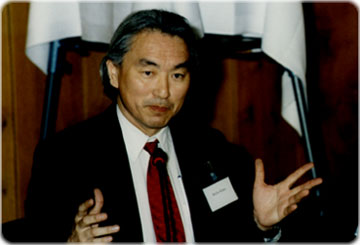Conference, September 8-10, 1999
Schloß Höchst, Frankfurt a.M., Germany
Mission | Program | Summary
Participants | Paper | Webcam
|
Conference, September 8-10, 1999 Schloß Höchst, Frankfurt a.M., Germany Mission | Program | Summary Participants | Paper | Webcam |
|||||
| |
Prof. Dr. Michio Kaku  Real Audio Presentation (25:56 min) (Installation Guide) Education - the Key of the Future Michio Kaku, professor of physics at City University in New York, gave a scenario of what the world might look like in the year 2020, 2050, 2100. By the year 2020, he said, a computer chip will cost about one penny and there will be chips in watches, glasses, and tie clips that will provide Internet access, download information, and be able to recognize faces, among other things. Computers as we know them will have died out. In addition, from 2020 the DNA revolution will be in full swing. Due to the technological advances, he argued, many kinds of jobs will die out, but intellectual capital will become a valuable commodity. The train to the future is going full steam ahead, he said, and the best ticket to get on board is education. |
||||
Project Background | Events | Reports and Essays Zukunftszeugen | Contact Us | Home Page Last Modified: 2002-04-23 TOP |
|||||